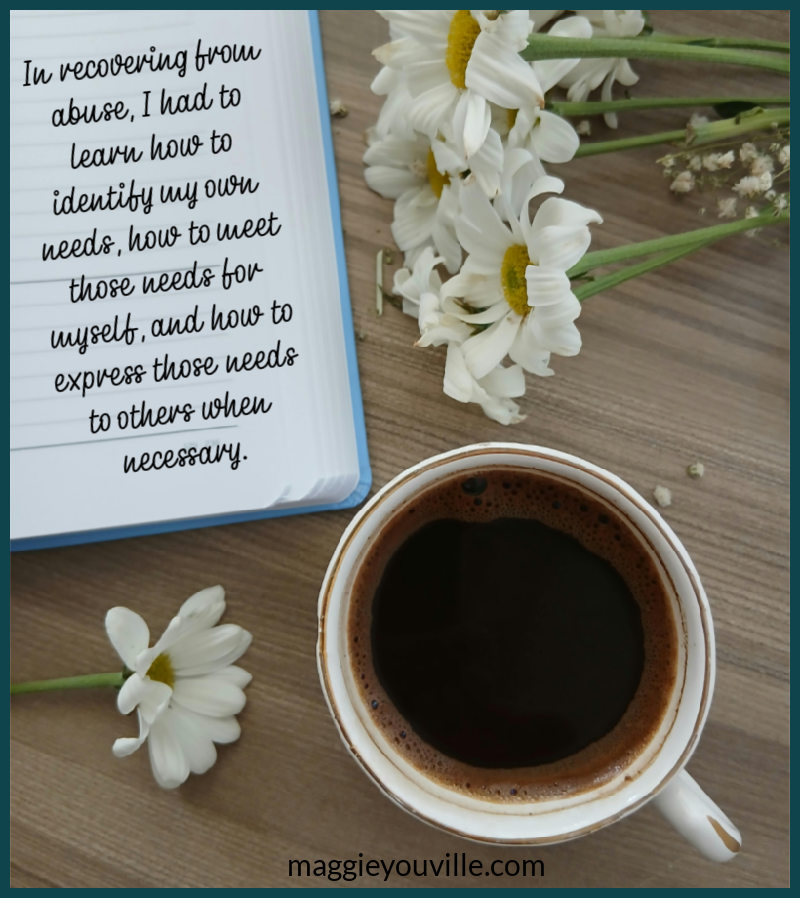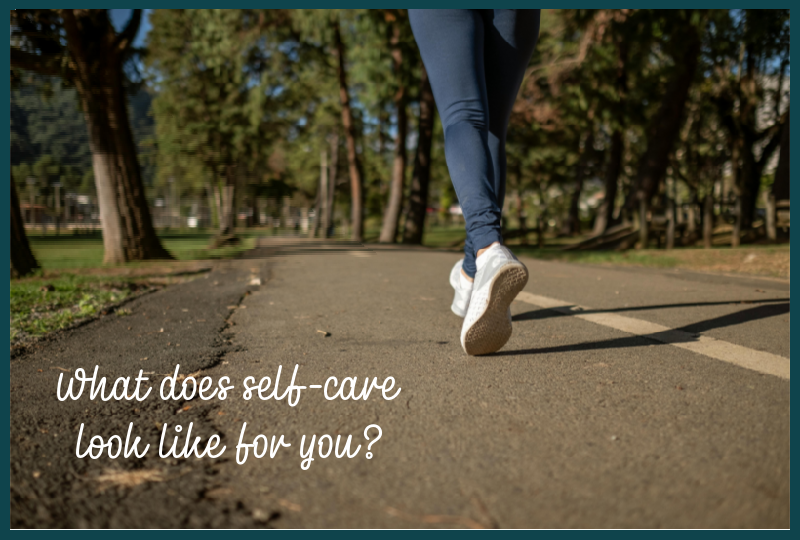One of the things I had to learn after escaping from my abusive relationship was self-care. Growing up with an abusive dad and then marrying an abusive husband, I had only learned how to take care of their needs, not my own. One sign of abuse is that the abuser demands all the consideration without giving any, expresses his needs without listening to yours, and expects accommodations for himself without offering any for you.
In recovering from abuse, I had to learn how to identify my own needs, how to meet those needs for myself, and how to express those needs to others when necessary. This doesn’t mean I became a selfish, demanding person. Rather, it required a self-knowing and self-awareness I hadn’t had before. I had to learn to pay attention to my emotions and my body, to recognize my own needs as well as I recognized my kids’ needs, and then respond properly.

Self-Care is Not Selfish
Taking care of myself was a necessary part of my healing process, but also better equipped me to take care of my children. In my abusive relationship, as I poured everything I could into my husband and kids, I burned myself out. Many moms know about burnout, but many of us may be unable to identify that part of the reason we are burned out is that we have no one pouring into us, taking care of us. If that is the case, then you need to be the person loving yourself so you can love others.
As Denise Jelinek acknowledges, “Many women frequently express feeling guilty or ‘selfish’ for allotting time and attention to caring for themselves.” However, she adds, “Taking care of your physical body is a way to worship the Lord. God not only wants, but also needs us to prioritize our physical health in order to fully serve Him and those around us.”
We acknowledge that our kids get tired and “hangry” and don’t function as well as they could, but we often fail to see that we ourselves do the same thing. It is difficult for me to give my kids the patience and grace they need when I am overtired or running on low blood sugar. Prioritizing my sleep and eating well are just basics to self-care that help me be a better mom, a better person.
Saint Paul tells us in his letter to the Galatians, “For the whole law is fulfilled in one word, “You shall love your neighbor as yourself” (5:14 RSV). Too many of us read the first part (“love your neighbor”) and forget the second part (“as yourself”). Often, we are loving others better than we love ourselves.
We’ve all seen the Halloween “mom” costume of the woman with dark circles under her eyes, greasy hair that hasn’t been washed in days, and stained clothing. She’s clearly not taking care of herself. What sort of example does this set not only for our children but for others in our lives? And what sort of message does that send about motherhood to our children and those around us? I want to set an example of being joyful and fulfilled in my vocation as a mom, but I cannot do that if I’m running on empty.

Self-Care is Healing
Self-care was an important part of my healing process after I left my ex-husband. Looking back, I can see that I had actually begun taking better care of myself several years before our separation. I had chosen to prioritize my own health by eating healthier food and taking supplements to treat my depression and eczema.
The National Domestic Violence Hotline acknowledges, “Self-care is a simple concept, yet for many of us, it can be incredibly difficult in practice. It is especially challenging for victims and survivors of abuse, who are often made to feel like they are not worthy of love or care. Even in incredibly difficult times, it helps to understand the importance of self-care.”
My ex-husband often made me feel not good enough or less-than, either with words or by how he treated me. I also blamed myself for reacting badly to his abuse and for not being a better mom to my children. This negative thought spiral made me feel like I couldn’t take time for myself or spend money on myself. I had to do more for them to make up for my failings. However, that was never enough.
As a beloved daughter of God, I am worthy of care. I do deserve to have my needs for sleep, good food, affection and more met. Giving myself care helped me turn around the negative thought spirals. It helped me acknowledge my self-worth and gain self-confidence (which I’d lacked since my teenage years).
As Battered Woman’s Support Services notes, “Self-care is a crucial part of the healing process. It can help restore a sense of control and well-being. Prioritizing mental health and recognizing the need for healing is a powerful and necessary step in reclaiming one’s life after abuse.” If you’re still in your abusive relationship, self-care can help you handle the abuse better and maybe start taking steps to get out.
What is Self-Care?
Self-care has become a buzz-word and million dollar industry in our society, but the truth is that often, we do not know how to take care of ourselves. We may do what we see others doing, or what has been promoted on social media as “self-care,” or just something that feels good, but self-care shouldn’t just be a to-do list item or a blank check to the spa.
If you aren’t used to doing self-care, start small. The National Domestic Violence Hotline says, “Making sure basic needs are met is the foundation of self-care. Do you get adequate sleep? Do you eat regular meals? Is physical activity part of your daily life? For some people, meeting these basic needs might not be possible all at once, so it might be helpful to focus on one at a time. Others may choose to make a list to remind themselves to meet at least one basic need or do one self-care activity daily.”
Author Colleen C. Mitchell equates self-care with self-compassion: “When we practice self-compassion, we are digging to the depths of true self-care. There are times when self-compassion looks like desperately reaching out for help when my pain is much to bear alone. And there are other times when it simply allowing myself a ‘self-compassion sweatpants’ day where I bypass the urge to value productivity over a genuine need for rest and comfort. Sometimes it looks a pedicure and sometimes it looks like a long, honest confession.”
When we have compassion for ourselves, we can recognize our own needs and then meet those needs. This means that self-care may look different at different times of day or during different seasons of your life. It may look different for you than for your best friend. Sometimes self-care means taking care of physical needs (hunger, exhaustion, hygiene) and sometimes it means taking care of emotional or mental needs (exhaustion, overwhelm, depression).
Some ideas for self-care include:
- Getting a massage, pedicure / manicure, or facial
- Going dancing with friends
- Running, biking, or hiking
- Curling up in a fuzzy blanket with quiet music playing
- Meeting a friend for coffee
- Stopping to pray the rosary
- Seeing a therapist
- Working out at a gym
- Making a cup of tea in the middle of a busy afternoon
- Reading a book for twenty minutes
- Visiting the adoration chapel

When Your Spouse Doesn’t Support Your Self-Care
If your spouse expects that you exist to meet his needs, he will likely not support your efforts to meet your own needs. He may complain about the expense of your self-care, or be unavailable to take care of the kids so you can do something you’d planned, or just make you feel guilty for taking time for yourself (without him and the kids).
Here are some ways you can meet your needs despite his opposition.
First, reread this article. Recognize that it is not selfish to meet your own needs. Remind yourself that by taking care of yourself, you will be better able to take care of others.
Second, find ways to meet your needs without his assistance or participation. Can you swap childcare with a friend or put the children in childminding at the local gym or rec centre while you workout there? Can you take the kids on a bike ride or run with you? Can you workout at home? Can you put on a TV show for twenty minutes for them so you can pray or read or have a hot tea?
Third, look for deals. Is there free childminding somewhere? A half-price deal at a local gym or local running gear store? A coupon for a spa online? Sometimes a great deal can make an activity more appealing.
Fourth, do it with a friend. If you make a commitment to meet a friend every week, or mention that you’re supporting a friend in her weight loss or marathon-running goals, then your spouse may be more likely to support you.
Fifth, get a professional recommendation. See your doctor or therapist about your concerns (for example, I asked my doctor about my depression and eczema) and then follow their advice. Some abusers are more likely to listen to an expert than to you saying you think you need something. And you may be more likely to follow-through if your doctor or therapist is supporting you and checking on you.
Choose Self-Care Today
Take some time to pray and think about what your needs are and how you can better take care of yourself. Look at where you can implement some form of self-care everyday, whether that’s just sitting down for five minutes to drink your coffee while it’s hot or asking a friend to take the kids for an hour so you can go for a run. Mention this to a friend so you can encourage each other to take care of yourselves.
Leave a Reply